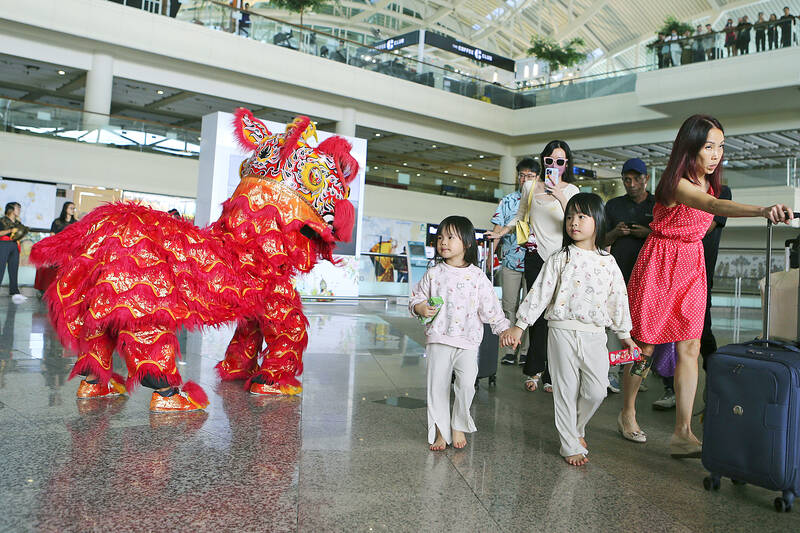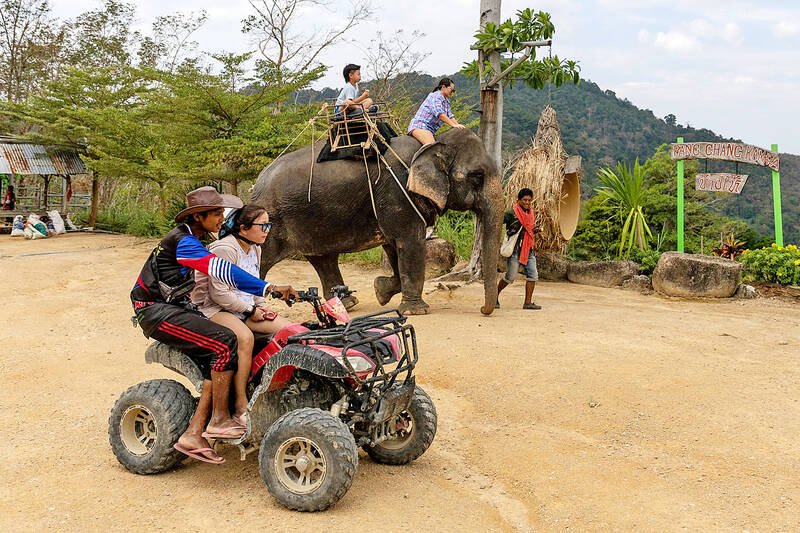Hitting the white sand beaches and eating mango sticky rice and seafood, Chinese tourists are returning to Thailand for their first trips abroad since China ended its strict COVID-19 curbs and reopened its borders.
“Because of the pandemic, we hadn’t been out of China for three years,” said tourist and business owner Kiki Hu, 28, in Krabi on Thailand’s southwest coast. “Now that we can leave and come here for holiday. I feel so happy and emotional.”
With China celebrating the Lunar New Year, Asia’s tourist hotspots have been bracing for the return of Chinese tourists, who spent US$255 billion a year globally before the pandemic. Countries from Thailand to Japan had depended on China as their largest source of foreign visitors.

Photo: AP
Beijing last month abruptly dropped some of the toughest COVID-19 restrictions in the world, which had battered the world’s second-biggest economy.
Business owner Yoyo Chen, 32, from Yiwu in central China, said that returning to Thailand felt like coming home.
“I’m here to eat seafood. Previously, when I was here, I ate mango sticky rice, which was delicious. Back in China I kept thinking about the mango sticky rice here. I’m looking forward to the food, as well as visiting the beaches,” Chen said.

Photo: Reuters
“Getting visas is very convenient now. The tourism industry is more developed here, there are lots of fun activities and cuisine, and the Thai people are very hospitable,” she said.
The Chinese return was welcomed by businesses, despite some wariness about a huge spike in COVID-19 infections in China after Beijing ended its “zero COVID” policy.
“We’re glad that China finally allows their people to travel. At the moment, we’ve received some bookings through March,” said Woranuch Maungtong, 44, manager of Tip-Top Destination on Phuket, which provides daily speed boats to nearby islands.
Chinese visitors accounted for nearly one-third of third of Thailand’s 40 million foreign tourist arrivals in pre-pandemic 2019.
The Thai government is expecting at least 5 million Chinese tourist arrivals this year, with about 300,000 coming in the first quarter.
Meanwhile, a direct flight from China yesterday landed in Bali, Indonesia, for the first time in nearly three years after the route was suspended due to the pandemic.
At least 210 people were on board the chartered plane operated by Indonesia’s Lion Air from Shenzhen in China’s southern Guangdong Province.
“I feel very happy and relaxed. It was a long time we did not go abroad,” said An Pei, a Chinese tourist who was on the flight.
The Shenzhen-to-Bali route will operate once a week during its initial phase, a statement from Lion Air spokesperson Danang Mandala Prihantoro said.
Indonesia is targeting 255,000 tourists from China this year. It recorded 94,924 visits from China from January to October last year. More than 2 million tourists from China visited Indonesia each year before the pandemic.
The return of Chinese tourists is expected to support the overall target of foreign tourist arrivals this year. Indonesia aims to record 3.5 million to 7.4 million foreign visits, Indonesian Minister of Tourism and Creative Economy Sandiaga Uno said in a statement on Friday. China is one of the largest markets for inbound tourism in Indonesia.

Kehinde Sanni spends his days smoothing out dents and repainting scratched bumpers in a modest autobody shop in Lagos. He has never left Nigeria, yet he speaks glowingly of Burkina Faso military leader Ibrahim Traore. “Nigeria needs someone like Ibrahim Traore of Burkina Faso. He is doing well for his country,” Sanni said. His admiration is shaped by a steady stream of viral videos, memes and social media posts — many misleading or outright false — portraying Traore as a fearless reformer who defied Western powers and reclaimed his country’s dignity. The Burkinabe strongman swept into power following a coup in September 2022

TRUMP EFFECT: The win capped one of the most dramatic turnarounds in Canadian political history after the Conservatives had led the Liberals by more than 20 points Canadian Prime Minister Mark Carney yesterday pledged to win US President Donald Trump’s trade war after winning Canada’s election and leading his Liberal Party to another term in power. Following a campaign dominated by Trump’s tariffs and annexation threats, Carney promised to chart “a new path forward” in a world “fundamentally changed” by a US that is newly hostile to free trade. “We are over the shock of the American betrayal, but we should never forget the lessons,” said Carney, who led the central banks of Canada and the UK before entering politics earlier this year. “We will win this trade war and

‘FRAGMENTING’: British politics have for a long time been dominated by the Labor Party and the Tories, but polls suggest that Reform now poses a significant challenge Hard-right upstarts Reform UK snatched a parliamentary seat from British Prime Minister Keir Starmer’s Labor Party yesterday in local elections that dealt a blow to the UK’s two establishment parties. Reform, led by anti-immigrant firebrand Nigel Farage, won the by-election in Runcorn and Helsby in northwest England by just six votes, as it picked up gains in other localities, including one mayoralty. The group’s strong showing continues momentum it built up at last year’s general election and appears to confirm a trend that the UK is entering an era of multi-party politics. “For the movement, for the party it’s a very, very big

SUPPORT: The Australian prime minister promised to back Kyiv against Russia’s invasion, saying: ‘That’s my government’s position. It was yesterday. It still is’ Left-leaning Australian Prime Minister Anthony Albanese yesterday basked in his landslide election win, promising a “disciplined, orderly” government to confront cost-of-living pain and tariff turmoil. People clapped as the 62-year-old and his fiancee, Jodie Haydon, who visited his old inner Sydney haunt, Cafe Italia, surrounded by a crowd of jostling photographers and journalists. Albanese’s Labor Party is on course to win at least 83 seats in the 150-member parliament, partial results showed. Opposition leader Peter Dutton’s conservative Liberal-National coalition had just 38 seats, and other parties 12. Another 17 seats were still in doubt. “We will be a disciplined, orderly